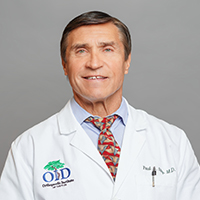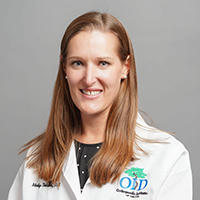Shoulder Care Specialists
Orthopaedic Institute of Dayton
Orthopedic Shoulder Specialists located in Springboro, Miamisburg, Dayton, & Tipp City, OH
Sections
Our Shoulder Specialists
Shoulder Surgery
Your shoulder joint is extremely movable — sometimes, too movable. Because your shoulder can move in any direction, there are many ways to injure it. When a shoulder injury or degenerative joint damage drags you down, Orthopaedic Institute of Dayton, located in Dayton, Miamisburg, Springboro, and Tipp City, Ohio, has experienced orthopedic surgeons who can help. Click on the scheduling link or call the nearest office to book your shoulder surgery consultation now.
Shoulder Surgery Q&A
When might I need shoulder surgery?
You might need shoulder surgery if you have shoulder pain and flexibility problems that don’t improve after trying nonsurgical pain management like physical therapy, anti-inflammatory medication, and injections.
There are many reasons that you might have persistent shoulder pain and flexibility problems, including:
- Rotator cuff injuries
- Labral tears
- Shoulder arthritis
- Fractures
- Bone spurs
- Scar tissue
- Loose bodies (cartilage)
- Inflamed joint lining
- Frozen shoulder
- Recurrent shoulder dislocations
- Shoulder impingement syndrome
In some cases, you may need shoulder arthroscopy, a minimally invasive shoulder surgery, to diagnose the cause of your chronic shoulder issues.
What are the different types of shoulder surgery?
There are two primary categories of shoulder surgery, minimally invasive and open surgery. Minimally invasive procedures, for example, shoulder arthroscopy, require buttonhole-sized incisions, while open surgery requires larger incisions of up to 6 inches long.
Some of the many different specific procedures for shoulder problems are:
- Rotator cuff repair
- Superior labral (SLAP) repair
- Subacromial decompression
- Shoulder stabilization
- Shoulder joint replacement
- Reverse shoulder joint replacement
- Revision shoulder replacement
- Fracture repair
The Orthopaedic Institute of Dayton surgeons use minimally invasive methods whenever possible, but in some cases, you may need open surgery.
How do I prepare for shoulder surgery?
Before your surgery, you’ll have a preoperative exam. This usually includes lab work, X-rays, an electrocardiogram (EKG), and other tests to make sure you’re medically cleared for the procedure.
If you take medications like blood thinners, you’ll likely have to stop taking them until after your shoulder surgery based on your doctor’s directions.
As with all types of surgery, it’s best to stop smoking prior to shoulder surgery. Smoking prevents you from healing quickly and can leave you vulnerable to complications.
What happens after shoulder surgery?
Orthopaedic Institute of Dayton gives you specific recovery plans before your surgery. Physical therapy is, in most cases, a major part of your recovery plan.
You’ll most likely wear a shoulder immobilization device after your procedure, and you’ll typically sleep in a partly reclined position after shoulder surgery.
Although you’ll usually need pain medication for a short period after your surgery, thanks to innovative pain management techniques you’ll probably be able to switch to over-the-counter medication fairly quickly.
If your shoulder pain isn't improving, shoulder surgery could be the best option. Call Orthopaedic Institute of Dayton or use online booking to arrange a consultation now.
Shoulder Arthroscopy
If you have rotator cuff problems, labral tears, shoulder impingement, or other shoulder joint problems, a minimally invasive procedure called shoulder arthroscopy could restore full shoulder function. Orthopaedic Institute of Dayton, with offices in Dayton, Miamisburg, Springboro, and Tipp City, Ohio, can treat most shoulder problems in this way, giving you great results without staying overnight in the hospital. Call the office nearest you or click the online appointment tool now.
Shoulder Arthroscopy Q&A
What is shoulder arthroscopy?
Shoulder arthroscopy is a procedure to diagnose and treat problems within your shoulder joint. Arthroscopy requires tiny incisions of around a half-inch long. A pencil-sized arthroscope, which has an internal camera and light, magnifies the inside of your shoulder.
The inside of your joint appears on a monitor. By viewing the joint in great detail, surgeons can diagnose problems. Then, they can make surgical corrections like repairing tears and removing cartilage using miniature surgical tools.
When might I need shoulder arthroscopy?
You might need shoulder arthroscopy if you have a shoulder problem such as:
- Rotator cuff damage
- Bone spurs
- Scar tissue
- Labral tear
- Ligament tear
- Loose cartilage
- Inflamed joint lining
- Recurrent shoulder dislocations
- Shoulder impingement syndrome
- Frozen shoulder
In many cases, shoulder arthroscopy is a viable alternative to traditional open surgery, so there may also be other situations in which your Orthopaedic Institute of Dayton specialist may recommend this procedure.
How do I prepare for shoulder arthroscopy?
Before your shoulder arthroscopy, you’ll usually need some preoperative tests such as X-rays, lab work, and electrocardiogram (EKG). You may also need to temporarily discontinue certain medications and supplements that increase the risk of bleeding, according to your doctor’s instructions.
If you smoke, it’s important to stop before your shoulder arthroscopy. Smoking can significantly slow your healing while increasing the risk of surgical and anesthesia complications.
What are the advantages of shoulder arthroscopy?
Shoulder arthroscopy offers many advantages, especially when compared to open shoulder surgery.
These include:
- Less damage to shoulder tissues
- Shorter recovery time
- Outpatient procedure
- Less pain
- Less risk of infection
- Less scarring
While shoulder arthroscopy does offer a much easier recovery than open shoulder surgery, it’s still a surgical procedure that requires some recovery time. You’ll learn the specific timeline for recovery before your procedure.
The best way to maximize your recovery after shoulder arthroscopy is to stick with the physical therapy and activity plan prescribed by your doctor. Regular physical therapy can improve your strength, flexibility, and range of motion.
Orthopaedic Institute of Dayton has the best reputation for orthopedic excellence because their surgeons combine superior skill with compassionate care. Book your appointment by calling the nearest office or clicking the scheduling link now.
Rotator Cuff Repair
Rotator cuff injuries are commonplace in the sports world, but they’re also a frequent source of pain in all adults. The team at Orthopaedic Institute of Dayton, located in Dayton, Miamisburg, Springboro, and Tipp City, Ohio, specializes in arthroscopic rotator cuff repairs, which is an essential procedure for athletes or anyone who relies on having a strong and stable shoulder. To learn whether you might benefit from a rotator cuff repair, call the office nearest you or book online today.
Rotator Cuff Repair Q&A
What is the rotator cuff?
Your rotator cuff is made up of four muscles and their tendons. These tissues have the important job of holding your upper arm in the shoulder socket. They’re also responsible for stabilizing the shoulder joint while allowing your arm to go through its full range of motion.
What causes a rotator cuff tear?
Rotator cuff tears usually occur in the tendons that connect the muscles to your upper arm. This type of tear may be caused by:
Acute injury
Falling onto your arm or lifting a heavy object often leads to an acute rotator cuff injury. It’s also common for the tendons to tear when you dislocate your shoulder.
Degenerative damage
Repetitive movement gradually wears down the rotator cuff tissues, eventually making them weak enough to tear. Bone spurs in the shoulder joint cause a similar problem, as they continuously rub against the soft tissues.
When might I need surgical rotator cuff repair?
The initial treatment for a rotator cuff injury or tear is rest, activity modification, and immobilization. As the tissues heal, you can begin rehabilitation to restore strength to the joint.
Your Orthopaedic Institute of Dayton doctor may recommend surgery to repair the rotator cuff when:
- Your pain doesn’t improve with conservative treatments
- You use your arms for overhead sports or work
- You have significant shoulder weakness
- Your tear is acute (brand new)
- You have a large tear
What happens during rotator cuff repair?
A partial rotator cuff tear may only need to have the damaged tissue trimmed away and inflamed tissues removed. Orthopaedic Institute of Dayton repairs a complete tear by re-attaching the tendon back to its original site on the upper arm bone.
Your surgery may be performed using a mini-open repair, or most often, minimally invasive arthroscopic surgery. The difference between them is the size of your incision. Open surgery has the longest cut, while arthroscopy is the least invasive with tiny incisions.
The type of procedure that’s best for you depends on variables like the severity of your rotator cuff injury, whether you have other shoulder problems being repaired at the same time, and your overall health.
If you suffer from shoulder pain, you may need a rotator cuff repair. To schedule an appointment, call Orthopaedic Institute of Dayton or request an appointment online today.
Shoulder Pain
Your shoulder is one of the most flexible joints in your body. However, the structure and function of your shoulder also makes it a common source of injury that leads to shoulder pain. The team at Orthopaedic Institute of Dayton, located in Dayton, Miamisburg, Springboro, and Tipp City, Ohio, specializes in diagnosing and treating shoulder pain. They understand the complexity of the shoulder and offer many non-surgical treatments to alleviate pain. Call the office closest to you or schedule an appointment online today. Same-day appointments are available.
Shoulder Pain Q&A
What is shoulder pain?
Your shoulder is a complex joint that forms the connection between three bones, including your humerus (upper arm bone), scapula (shoulder blade), and clavicle (collar bone). Muscles, ligaments, tendons, and cartilage keep the bones in place and support your shoulder’s mobility.
Any condition that affects the joint or supportive tissue may cause shoulder pain. The pain may be severe, occurring suddenly after a bad fall onto the arm or a dull aching sensation that worsens over time.
Though not all types of shoulder pain need medical intervention, if your shoulder pain limits your mobility or fails to improve within a few days of at-home care, schedule a consultation with the experts at Orthopaedic Institute of Dayton.
What causes shoulder pain?
Injuries, overuse, degenerative conditions, or an underlying disease may cause shoulder pain. Common conditions that cause shoulder pain include:
- Arthritis
- Rotator cuff injuries
- Labrum tear
- Bursitis
- Tendonitis
- Impingement
- Fractures
- Dislocation
- Frozen shoulder
With these types of shoulder problems, your pain may worsen when you move your shoulder. When you have shoulder pain from problems related to your neck or back, movement of your shoulder may not worsen your discomfort.
What happens during a shoulder pain evaluation?
When you visit Orthopaedic Institute of Dayton for a shoulder pain evaluation, you can expect a comprehensive exam. Your provider reviews your symptoms and medical history and examines your shoulder.
They also ask detailed questions about your pain to help determine the underlying cause.
The shoulder pain experts also run tests to confirm or rule out a suspected diagnosis that might explain your symptoms, such as an X-ray, CT scan, bone scan, MRI, nerve conduction studies, or lab work.
For your convenience, Orthopaedic Institute of Dayton offers on-site MRI scans.
How is shoulder pain treated?
The board-certified orthopedic surgeons at Orthopaedic Institute of Dayton customize your shoulder pain treatment plan based on the underlying cause of your pain and severity of symptoms.
In most cases, the experts resolve shoulder pain without the need for surgery using treatments such as:
- Splinting or bracing
- Physical therapy
- Nonsteroidal anti-inflammatory drugs (NSAIDs)
- Ultrasound-guided injections
If you need surgery for your shoulder pain, your provider performs your procedure at the on-site surgery center. The type of surgery they perform depends on your diagnosis. In most cases, they use arthroscopic techniques to minimize tissue damage and recovery time.
The full-service orthopedic practice also performs shoulder joint replacement procedures, including reverse total shoulder replacement for complex shoulder arthritis.
Shoulder pain requires special care but responds positively to conservative care. For management of your shoulder pain, call Orthopaedic Institute of Dayton or schedule an appointment online today.

